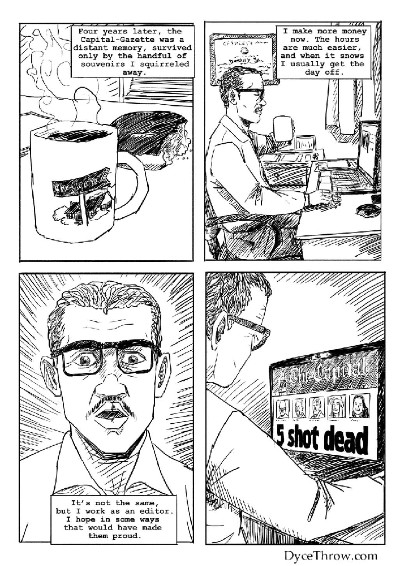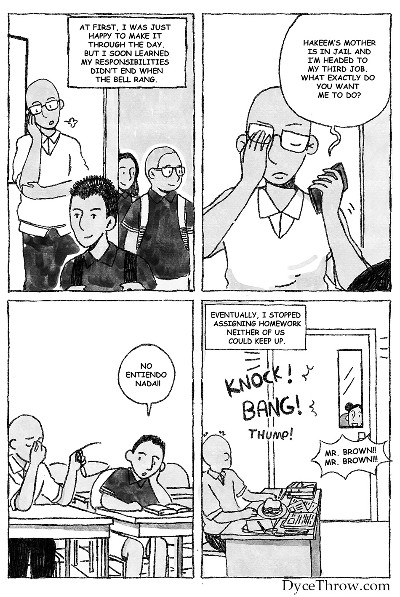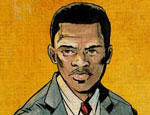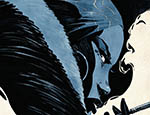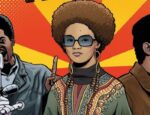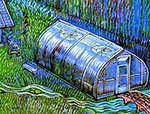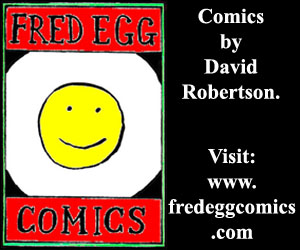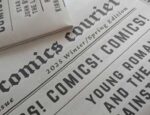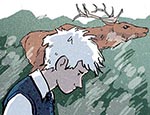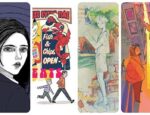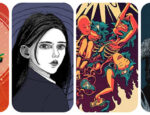Generally in the preamble to an interview we summarise the topic in hand with a brief overview of creator/project. But in the case of of R.D. Hunter’s Black Boy’s Blues: Funny Money – currently crowdfunding on Kickstarter – it seems more appropriate to directly quote his own words from the KS page about the story behind the stories collected in this anthology.
On June 28, 2018, a man barricaded the only exit to the offices of the Capital Gazette Newspaper and charged in with a shotgun. At the end of the mass shooting my former editor, and several co-workers were identified among the dead.
Fortunately, I wasn’t there. I was a terribly inexperienced journalist and quit just before the shooting. I spent the next few years wondering if my life was saved by my own ineptitude. Maybe, if I had been a better writer, I could have done something.
On the third anniversary of the shooting, just days before the start of the gunman’s trial, I published a comic about my experience on the internet message board, Reddit.com. The cathartic experience of creating a comic and the overwhelmingly positive response I received helped me deal with what I now recognize as survivor’s guilt.
Since then, Hunter has gone on to create more comics chronicling “the life of a millennial African American college graduate as he travels the globe in search of love and meaning” in collaboration with artists like facuacu, minodred, corresbergue, janm, Caroline Kerschner, Manuel Clavijo, Patricia MBPEC and Tudor Badea. I caught up with him to chat about graphic memoir, catharsis through comics and the particular vulnerabilities of autobio work…
https://www.kickstarter.com/projects/rdhunter/black-boys-blues-an-honest-graphic-novel-of-hard-times
ANDY OLIVER: Before we talk specifically about Black Boy’s Blues: Funny Money can you give us a little background on yourself and why comics are your medium of choice?
R.D. HUNTER: I grew up reading Calvin and Hobbes as a kid. The combination of words and pictures seemed like it was more engaging than reading strictly prose or being spoonfed plot through a movie. I work professionally as a web editor (most recently for the Smithsonian’s National Museum of African American History and Culture) so I’ve spent a lot of my life carefully juxtaposing words and pictures.
I was never into the superhero power fantasies. I got really into more autobiographical comics like Harvey Pekar’s American Splendor and Art Speigleman’s Maus around College. They helped me see that comics could tell real, personal stories. Later on I stumbled onto Ebony Flower’s Hot Comb and John Lewis’ March series and realized there was an audience ready for Black voices as well. However, it wasn’t until I read Scott McCloud’s series on Making Comics that I really saw the limitless potential in the medium.
‘Annapolis’, art by facuacu
AO: The comic that began this journey, focussing on the Capital Gazette shooting, is a very powerful piece of storytelling. Was there something therapeutic about working through your feelings about those events via the comics page?
HUNTER: After I learned about the shooting, I didn’t feel like I had permission to talk about it. Nothing had happened to me, so why should I feel bad? This is America, I’m Black, and people die in shootings all the time.
I had hoped the pain would just go away. But every now and then I’d recall the layout of the newsroom on 888 Bestgate Road and watch the scene play out in my mind. Lots of things triggered it, and it made me profoundly sad. These were good people who loved their community, and even if they weren’t, no one deserves what happened to them.
When I published the first comic, entitled ‘Annapolis’, it felt like I was taking a waking nightmare from my mind and sharing it with others online. I didn’t expect it to get as many comments as it did, but many of the messages I read mentioned “Survivor’s Guilt.” When the beast finally had a name I felt like I had permission to confront it. I’m in therapy now and I feel significantly less sad.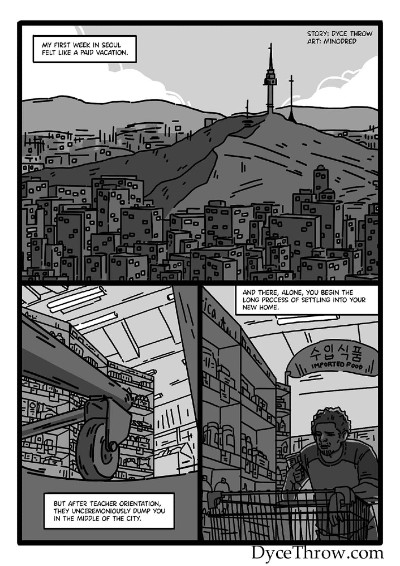
‘Seoul’, art by Minodred
AO: Black Boy’s Blues compiles a number of autobio stories. How would you describe the book in terms of the subject and themes it covers?
HUNTER: Money is a really central theme in the ‘Annapolis’ comic. The lack of it decimated the industry and my career within it. When I wrote the next comic, entitled ‘Seoul’, I realized I had only gone to Korea to teach because I graduated at the height of the 2008 recession with few job prospects. Even now as an adult with a decent income, the fear of losing my job dictates more of my life than I’d like to admit.
I found it funny how much of our lives are dictated by our relationship to money and made it the central theme of all the stories in the book.
AO: Following on from the previous couple of questions, how much of a sense of vulnerability is there about putting such intensely personal work out into the world?
HUNTER: All of the stories in this book were difficult to write, but incredibly cathartic to share. I was really surprised by how receptive people were to listening about pain and depression. I wish I had the courage to talk about my experiences sooner.
I am exceptionally fortunate. If you google statistics related to African American men, I’ve had a mathematically provable great quality of life. There are people out there who will, or currently are, experiencing much worse, but they won’t ask for help or speak up because no one else is doing it. I wish we lived in a world where honesty and vulnerability were the norm.
‘Washington D.C.’, art by janm
AO: What have reader reactions been like to the work you’ve previously published online?
HUNTER: I’ve published several comics from the book on my website (DyceThrow.com) and on Reddit and I’ve been really surprised how empathetic even critical readers were to the situations in the book.
The most common response I’ve gotten was, “I’ve gone through this exact experience, and this is exactly how I felt.” Grief, love, and depression are common experiences most people have in their adult lives, but few people talk about them.
The second most common responses are from people who have never had the experiences detailed in the book and are curious to explore them. After I posted my comic, entitled ‘Seoul’, on my experience living abroad for two years, my website was flooded with Korean users. They translated the comic so they could see their city through the eyes of a foreigner.
AO: You’re taking something of a Pekar-esque approach to autobio here in regards to the collaborative process. How did you curate the book in terms of matching up specific artists’ styles and approaches to the subject matter of each story?
HUNTER: I spent probably as much time poring through portfolios as I did writing the scripts for the comics themselves. While these stories are true, I have a personal preference for style over realism. The artist I got to work on the ‘Annapolis’ comic has a flat, sketchy style that reminded me of the black and white newspaper cartoons I read growing up. Negotiating international exchange rates, culture/language barriers and timezones was difficult, but I’m really proud of the diversity each of the artists brought to the project.
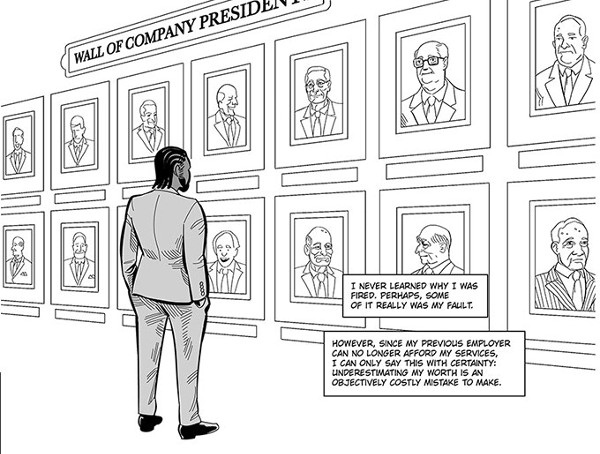
AO: The book is currently crowdfunding on Kickstarter. What are some of the rewards and incentives available for backers?
HUNTER: I wanted to make sure backers got the highest quality print book as quickly as possible so our campaign doesn’t have a lot of fluff backer goods like stickers and t-shirts. Those looking to support the project beyond physical copies can have their names, or a commissioned illustration of their likeness, printed in the final copy of the book.
The book is fully funded, so I’m proud that I can personally guarantee that everyone who wants a physical copy will get one. But our next big $5K milestone stretch goal will add a brand new 8-page story to the book. The comic, entitled ‘Rio’, will chronicle my month-long experience couch-surfing through Brazil with only a backpack and a strained romantic relationship.
AO: And, finally, what are your future comics plans? Do you have any other comics projects in development?
HUNTER: The publication of this book comes at an odd time in my life. After we ship out physical copies I’ll be getting married (to a lovely woman mentioned in the book) and quit my job to backpack around the world (mostly South America and Asia). During the year abroad, I’m planning to document my adventures on my blog (https://serioustravelcouple.com/) and dedicate the entirety of the next Black Boy’s Blues to the challenges of long-term international travel.





